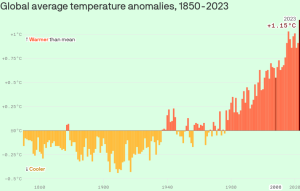
Significant climate milestones of 2023
Vijay GarG
Vijay GarG Retired Principal Educational columnist malout Punjab
From registering the hottest summer on record to some significant steps at the yearly United Nations climate summit, 2023 was a year of extremes. Here are some climate-related milestones from this time.
Hottest year: The year is all but set to be declared the hottest in history. According to the Copernicus Climate Change Service (C3S), 2023 was 0.1°C warmer than the 10-month average for 2016, currently the warmest calendar year on record, and 1.43°C warmer than the pre-industrial reference period from January to October.
Highest sea surface temperature ever: Marine heat waves – periods when ocean temperatures are warmer than 90% of prior observations for a given time of year were widespread in 2023. According to the U.S. National Ocean and Atmospheric Administration (NOAA), 48% of global oceans experienced them in August 2023. Global sea surface temperatures (SST) are usually highest in March. But per C3S data, global average SSTs remained at record highs throughout April, May, June, and July 2023.
Lowest Antarctic sea ice extent: Sea-ice extent is the area of ice covering the Antarctic Ocean at a given time. In 2023, Antarctic sea ice had record low ice growth from April. According to NOAA, sea ice in the Antarctic reached an annual maximum extent of 16.96 million sq. km on September 10, 2023, the lowest since 1979. This year’s maximum was 1.03 million sq. km, below the previous record low set in 1986.
Record carbon dioxide levels: Global carbon dioxide emissions are expected to have hit a new high in 2023, up 1.1% from 2022. The Global Carbon Budget Report, published in December 2023, said overall CO2 emissions, which climbed to a record last year, had plateaued in 2023 due to a slight drop in deforestation.
Loss and damage fund: The world’s first loss and damage fund for the impacts of climate change was created in 2023, at the start of the COP28 climate talks in the U.A.E. in early December. The fund will be based at the World Bank but managed by an independent secretariat. According to a senior U.N. official, it has received pledges of $792 million from governments, which is a lot but still well short of the billions required to fulfil its purpose.
Impact of food systems: For the first time in the history of climate summits, 134 countries at COP28 pledged to tackle the climate impact of the food industry. These countries represent over 5.7 billion people, 70% of the food we eat, nearly 500 million farmers, and 76% of total emissions from the global food system. But observers noted the declaration doesn’t include quantitative targets.
Vijay GarG Retired Principal Educational columnist malout from my iPhone
Hottest year: The year is all but set to be declared the hottest in history. According to the Copernicus Climate Change Service (C3S), 2023 was 0.1°C warmer than the 10-month average for 2016, currently the warmest calendar year on record, and 1.43°C warmer than the pre-industrial reference period from January to October.
Highest sea surface temperature ever: Marine heat waves – periods when ocean temperatures are warmer than 90% of prior observations for a given time of year were widespread in 2023. According to the U.S. National Ocean and Atmospheric Administration (NOAA), 48% of global oceans experienced them in August 2023. Global sea surface temperatures (SST) are usually highest in March. But per C3S data, global average SSTs remained at record highs throughout April, May, June, and July 2023.
Lowest Antarctic sea ice extent: Sea-ice extent is the area of ice covering the Antarctic Ocean at a given time. In 2023, Antarctic sea ice had record low ice growth from April. According to NOAA, sea ice in the Antarctic reached an annual maximum extent of 16.96 million sq. km on September 10, 2023, the lowest since 1979. This year’s maximum was 1.03 million sq. km, below the previous record low set in 1986.
Record carbon dioxide levels: Global carbon dioxide emissions are expected to have hit a new high in 2023, up 1.1% from 2022. The Global Carbon Budget Report, published in December 2023, said overall CO2 emissions, which climbed to a record last year, had plateaued in 2023 due to a slight drop in deforestation.
Loss and damage fund: The world’s first loss and damage fund for the impacts of climate change was created in 2023, at the start of the COP28 climate talks in the U.A.E. in early December. The fund will be based at the World Bank but managed by an independent secretariat. According to a senior U.N. official, it has received pledges of $792 million from governments, which is a lot but still well short of the billions required to fulfil its purpose.
Impact of food systems: For the first time in the history of climate summits, 134 countries at COP28 pledged to tackle the climate impact of the food industry. These countries represent over 5.7 billion people, 70% of the food we eat, nearly 500 million farmers, and 76% of total emissions from the global food system. But observers noted the declaration doesn’t include quantitative targets.
Vijay GarG Retired Principal Educational columnist malout from my iPhone


